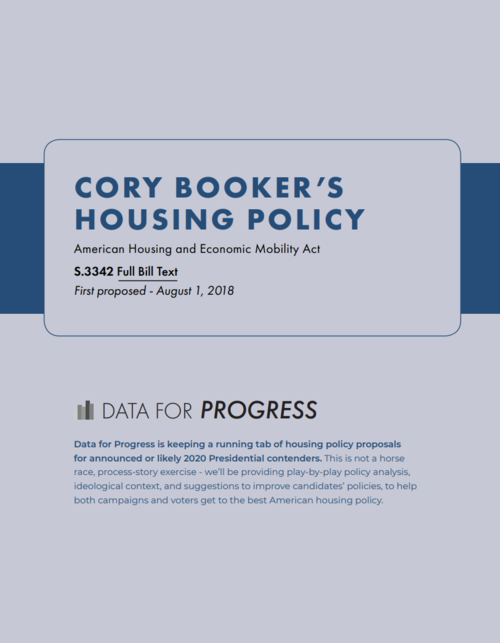Memo 5: Analyzing The 2020 Presidential Contenders' Housing Policies
By Henry Kraemer (@HenryKraemer) and Pete Harrison (@PeteHarrisonNYC)
Data for Progress is keeping a running tab of housing policy proposals for announced or likely 2020 Presidential contenders. This play-by-play policy analysis, ideological context, and suggestions to improve candidates’ policies are intended to help both campaigns and voters get to the best American housing policy.
Elizabeth Warren’s Plan
Warren’s housing proposal has three major focuses: Funding the construction of more private affordable housing for extremely low income households, combating local restrictive zoning laws, and addressing decades of racism in federal housing policy.
WHAT IT REVEALS ABOUT WARREN
This bill is vintage Elizabeth Warren - deadly serious about economic inequality, displaying nerdy insights into the origins of stagnation and poverty, and ultimately inclined to rewrite the rules of capitalism to make it work, rather than replace it root-and-branch. The focus on increasing homeownership rates for lowincome families of color reflects Warren’s pre-politics academic focus on bankruptcy and inequality. Her focus on racial and social justice in housing indicates an earnest interest in the unique economic plights of people of color and other oppressed groups. And her interest in using current structures of public-private partnership to fund affordable housing conveys reformist instincts.
Kamala Harris’ Plan
Harris’s bill focuses exclusively on easing rent burdens by allowing taxpayers who make less than $100,000 per year (or $125,000 in highcost areas) to claim a refundable tax credit for the rent and utilities they pay over 30% of their income. The proposal would allow individuals living in government-subsidized housing (including public housing) to receive the tax benefit as well.
WHAT IT REVEALS ABOUT HARRIS
This proposal reflects Harris’s background as a California politician hesitant to tackle the state’s treacherous housing politics and her campaign’s focus on redistributive cash transfers as a salve for the worst ravages of capitalism. California housing is defined by its multi-million unit home shortage and runaway rents, and by its stubborn resistance to change.1,2 Incumbent landlords and affluent homeowners constantly block movement to build more homes and real estate interests smother rent control efforts under mountains of cash.3,4 Housing tensions regularly divide the left.5 That Harris’s proposal ignores the main drivers of the problem in California suggests a fundamental skittishness about transformative change. It also fits her larger economic vision, which keeps the fundamentals of capitalism in place while pulling people back from the edge of poverty and lifting them into a higher standard of living through infusions of cash to meet their basic needs (similar to the LIFT Act, which currently serves as the centerpiece of her campaign).
Cory Booker’s Plan
Booker’s bill is best viewed as a partial hybrid between Elizabeth Warren’s and Kamala Harris’s. Like Warren, it attempts to combat local restrictive zoning measures. Like Harris’s, it calls for federal rental assistance through tax credits. It stands out from both with a unique addition intended to improve renters’ ability to build savings. Key Points:
WHAT IT REVEALS ABOUT BOOKER
As a former mayor of Newark, New Jersey, Booker is perhaps the most qualified candidate to speak about housing, but this bill speaks to his strengths and weaknesses as a legislator. The strengths are apparent in how this bill recognizes three core crises facing poor renters that need national attention: They pay too much of their income to housing, they have no ability to build savings, and they don’t have access to many communities that restrict affordable housing construction. The weaknesses are apparent in the bill’s follow through, which gives few details about how this policy would actually work. Booker is a gifted communicator in general with some good ideas on housing specifically, but he does not have a strong record of legislative achievement as a senator and has been guilty of making grand pronouncements without following up on solid policy details as mayor.







